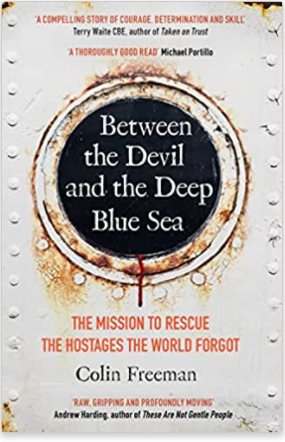The Reading Room

Between the Devil and the Deep Blue Sea
Colin Freeman
Published: 2021
Between the Devil and the Deep Blue Sea is a narrative of tragedy, extreme hardship, and bravery. Using first-hand accounts taken from the survivors, Freeman tells the story of 3 cargo ships and their crews kidnapped by Somali pirates and held hostage for five years, and in some cases longer. Ultimately though it is a tale of humanity’s enduring spirit of survival and the decency of a few individuals with little to gain, and much to lose, who take up the cause of the hostages, abandoned by everyone but their families. “Everyone” includes ship owners, insurance companies, governments, and international rescue agencies and charities.
John Steed, a retired British Army Officer working for the United Nations in Africa, breaks with convention, international policy on hostage negotiation and common sense to set about negotiating the release of the hostages. Focusing on just one of the three ships in detail, whilst referencing the other two, Steed undertakes the task of winning the trust of the captors to broker a deal. Using intermediaries about whom he knows little and trusts less he sets about negotiating a plausible ransom figure (a figure that has some slim chance of being raised), whilst using whatever means he can to appeal for donations from whatever source for the cause.
Of course, the intermediaries he works with are also “in it” for themselves and Steed has no real idea where the “hidden agendas” lie. On the other side of the bargain are Governments and International Agencies refusing to pay ransom monies, making Steed’s task of raising sums anywhere close to the captors’ expectations an almost impossible task. Steed soon realises that he is an amateur playing professionals’ poker when he is hoodwinked, not by the pirates, but by a German purporting to have the financial backing of charities willing to pay the ransom. Believing this to be the breakthrough they have been yearning for he opens the bidding, raising the expectations of the increasingly fraught pirates, soon to realise, he has nothing to offer.
The book also focuses on key characters on both sides. An Indian born seaman who wins the confidence of a Somali pirate, by learning the language which ultimately provide the breakthrough, as well as the ship’s Captain who continues to look out for his crew, whatever the price. Freeman talks to the families of the forgotten victims and how they coped with the absence of their loved ones.
For those of you who have seen the Hollywood blockbuster Captain Phillips, this will feel a little mundane by comparison perhaps. But the real value is in understanding the heroic characters who lived through every tortuous minute, both during and afterwards. Unsung heroes, forgotten then and barring this book, forgotten once more.
David Cornell
February 2022
The information contained above and in other entries in the Ocean Dial Book Review Series is intended for general information and entertainment purposes only, and should not be relied upon in making, or refraining from making, any investment decisions. No information provided herein should or can be taken to constitute any form of advice or recommendation as to the merits of any investment decision. You should take independent advice from a suitably qualified investment adviser before making any investment decisions.
The CEO Factory: Management Lessons from Hindustan Unilever
Published: 2019, Juggernaut Books
For six decades Hindustan Unilever has remained among India’s top five most valuable companies. No other Corporation in the world has done so well for so long. For the first time comes a book that decodes how this great business works – from a director of the company who has spent his whole career there.
Seven Decades of Independent India: Ideas and Reflections
Published: 2022, Penguin Books India
Has democracy in India fulfilled the aspirations of its people? Have institutions delivered? Have public policies succeeded in making substantial differences to living standards? Is the country secure on its external borders? Would the country become an economic powerhouse? And can India be a leading power in the years ahead?
Ikigai – The Japanese Secret to a Long and Healthy Life
Published: 2016, Cornerstone
We all have an ikigai. It’s the Japanese word for ‘a reason to live’ or ‘a reason to jump out of bed in the morning’. It’s the place where your needs, desires, ambitions, and satisfaction meet. A place of balance. Small wonder that finding your ikigai is closely linked to living longer.


